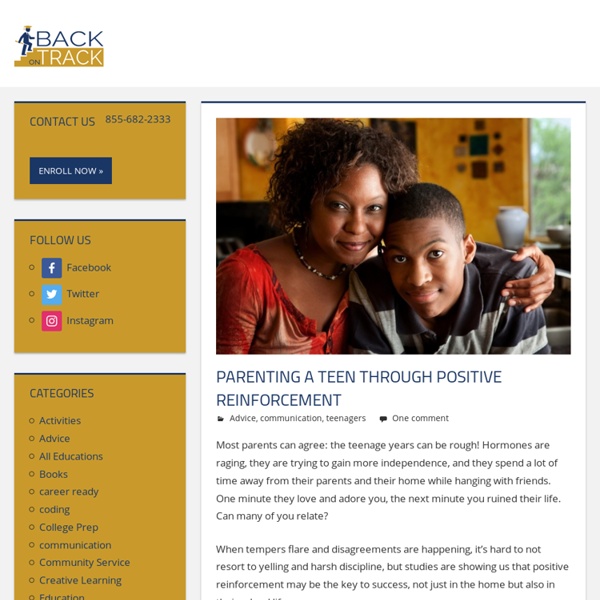Positive Reinforcement for Adolescents
By the time children have reached adolescence, their responses are often ingrained, but parental actions can still positively affect adolescent behavior. Since adolescents are struggling to develop their personal identity and are concerned about their body image, parental support is crucial to help positively frame experiences as learning opportunities. Positive reinforcement remains a powerful teaching tool during these formative years, and we encourage parents to take time to contemplate the ways they can help adolescents mature and become self-reliant. Reinforce mature decisions by allowing increased privileges when adolescent demonstrates increased responsibility.
The value of reinforcing positive behaviour for our teens
As children approach adolescence, they sometimes begin testing limits, bending the rules and otherwise going against the grain. While this is normal behaviour for teens, it can be incredibly trying for you, as a parent. Teenagers may also be dealing with the stresses that come with trying to fit in with their peers and assert their growing independence. However, at the same time, they are looking for validation from the adults around them. It's crucial, therefore, for parents and teachers to provide as much guidance and positive reinforcement as possible, rather than simply tightening the rules. While it may be challenging to reward and praise a teen, who may appear to be indifferent to us, it's well worth the effort.
Why Negative Reinforcement Works Better as Your Child Grows into A Teen
If you are someone who has always loved the freedom of “no strings attached”, the idea of marrying and having kids could be quite underwhelming. The idea of having a family always used to bug me, until I finally found the love of my life. It's when I categorically made up my mind about what I wanted from our marriage. I wanted kids, I was clear about that, but I wasn’t certain how I would be taking care of them. The Outgrow of Parenting Fears and My Redemption A year after my marriage, I got pregnant with a baby boy.
Article 1: "Positive Reinforcement for Adolescents"
By the time children have reached adolescence, their responses are often ingrained, but parental actions can still positively affect adolescent behavior. Since adolescents are struggling to develop their personal identity and are concerned about their body image, parental support is crucial to help positively frame experiences as learning opportunities. Positive reinforcement remains a powerful teaching tool during these formative years, and we encourage parents to take time to contemplate the ways they can help adolescents mature and become self-reliant.
How to Reward Your Teen for Good Behavior
Teenagers are young adults who are trying to learn the ways of the world. When they do something great at school or at home or simply make a healthy decision, parents can give them a reward. The reward does not have to be money, but it is a nice way to say "thank you" or "I'm proud of you." Teens need this positive reinforcement because it shows them that they are on the right track.1 It is also a good life lesson that you can pass on: good things happen to good people. When Do Teenagers Deserve a Reward? A teen can earn a reward for positive behavior or by changing negative behavior.1 While you should not feel that you have to "pay" for every good thing your teen does, reinforcement of good behavior will help ensure that it continues.
Parenting Children with Positive Reinforcement (Examples + Charts)
Children don’t come with instructions and discipline is often experienced by parents and children alike as an arena where our will and wits are tested. Positive reinforcement is only one of many forms of discipline, but from the perspective of positive psychology, it may as well be the most important one as it focuses on amplifying what is already good in our children and in ourselves as their caretakers. Positive reinforcement as a form of positive discipline allows us to tap into our children’s individual strengths, draw attention to their personality traits and interests, and as a result give us an opportunity to connect, communicate effectively, and ultimately empower them to be more of themselves. Before you read on, we thought you might like to download our 3 Positive Psychology Exercises for free. You can download the free PDF here.
BYU Study: a need for positive reinforcement among teens
There are countless publications describing the best ways to raise a child in the hopes of them becoming successful adults. Between the books, magazines and video tutorials, parents may be finding themselves overwhelmed on more than one occasion. But a group of researchers at Brigham Young University have found the answer to helping children through life may be less complicated than it seems. The BYU study found bad behavior can be discouraged among children by simply encouraging good behavior.
The Difference between Positive/Negative Reinforcement and Positive/Negative Punishment
February 5, 2013 7:40 pm Published by Kelley Prince M.A., BCBA In Applied Behavior Analysis, there are two types of reinforcement and punishment: positive and negative. It can be difficult to distinguish between the four of these. Therefore, the purpose of this blog is to explain the differences in order to help parents and professionals develop appropriate interventions to improve behavior.




This article shares how to manipulate the use of rewards to reinforce teenage behaviour. As children reach their teenage years, it would be a challenge to demand good behaviour from them. A good grasp of the best possible way of using rewards is critical for parents to avoid setbacks due to over relying on rewards. by sunoordy001 Mar 29